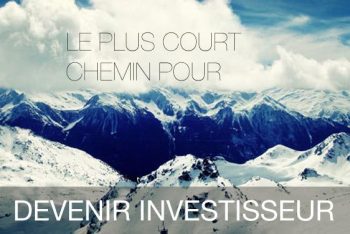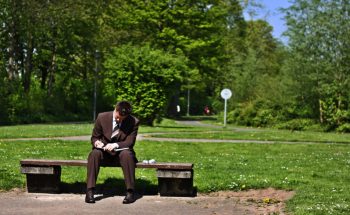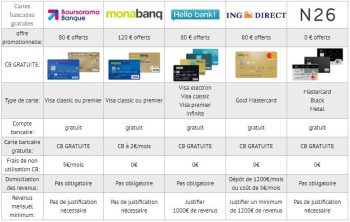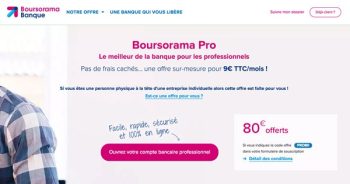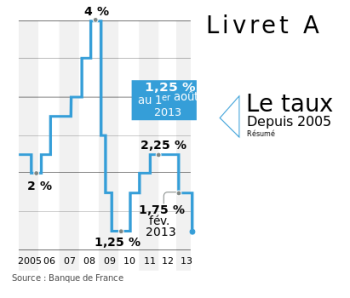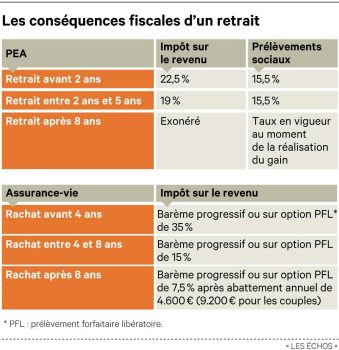Investment can take many forms.
This is an ultra-complex field, as there are hundreds of different ways you can invest…
…and yet each time you have to control the risk and obtain a good return.
But, exactly, where to start?
Wouldn’t it be great to have a solid starting point that prepares you for financial independence?
In this article, I precisely describe the financial foundations necessary before embarking on the investment.
My goal: that you can start off on the best possible path as an investor.
Let’s go.
Investing means first making the right decisions and identifying the products that offer the best prospects.
Here, I will start with the most basic (the bank account) and go to the most detailed (the stock exchange) in order to give you the best steps to follow, from the start of your investing career.
If you don’t have an account with ING Direct, Boursorama or Fortunéo then you are giving way too much money to your banker every month. Traditional banks are now greedy for fees of all kinds.
Nowadays, paying bank charges is an aberration. Account management, intervention commissions, top-of-the-range bank card…all of this is free with online banks.
They offer the same security as your traditional banks. No charge. 0 euros per year.
But that’s not all…
They offer you money if you open an account with them. This is to show you how certain these banks are of your satisfaction. At ING Direct & Boursorama, each new client is offered 80 euros.
For example, I am with ING Direct and this opening bonus was paid to me the day after the account was opened. It’s super-fast! And now I no longer pay any bank charges and I have a top-of-the-range credit card.
If, like the majority of French people, you pay more than 100 euros in bank charges of all types per year (account management, bank card, transfers, etc.) then switching to an online bank can easily save you money.
If you enter the sponsor code KHKDACC when registering, this also allows me to receive a commission when signing your account. Don’t worry, it doesn’t change anything for you, you will still receive €80.
Before you can invest, you need a solid foundation. And this involves building up a small security envelope.
Your car breaks down, you have to do emergency work at home…
This is what this pocket of money will be used for.
In concrete terms, you must include it in two savings accounts: the well-known Livret A (up to 22,500 euros) and the Livret de Développement Durable (12,000 euros).
These two booklets have a simple operation: the money is liquid, available immediately. It is the equivalent of a current account, remunerated at 1% per year, net of tax. In my previous article, I explain in detail the taxation of these booklets, and a large number of other investment vehicles.
Ideally, you should place in these booklets about 6 months of expenses. This is enough to allow you to overcome troubling events in your life (loss of job, serious accident), while leaving you enough time to recover.
As these are regulated products, all banks offer the same conditions. You won’t lose anything by going
at BNP or Caisse d’Epargne. Even online banks offer them, under the same conditions.
Thus, it seems clear that becoming an investor is not possible if you do not already have a pocket of security to face the hard knocks of life.
I will not return to the meaning of these products that I developed in particular in my previous article.
To be concise, the PEA (Plan d’Epargne Actions) is used to buy shares on the European stock markets and Life Insurance is a savings product allowing you to invest in different media including government bonds and ‘real estate.
The key to these products is their taxation: it is inversely proportional to the length of time the product is held. Clearly, the longer you have held a PEA or life insurance, the less tax you pay on the capital gains made!
As time is the only variable in play, it therefore makes sense to open a Life Insurance and a PEA to take a date : even if you don’t put anything into it for years, you still reduce your future taxation.
For example, on life insurance, the taxation is clearly degressive, going from 35% to 7.5% if you opt for the flat-rate withholding tax:
In terms of choice for your life insurance, the best contracts are online. Linxea, for example, offers remunerative contracts at very low cost. For example, their Linxea Avenir contract is a good start if you are new to life insurance.
With regard to the PEA (Plan Epargne Actions), the questions asked are substantially the same. You have to open your PEA with the least possible expense. There are a large number of players that allow the opening of PEAs: Binck, Bourse Direct, Interactive Brokers, etc.
Bourse Direct is the cheapest for all French and European stocks. Placing an order costs less than 1 euro for an invested amount of 1,000 euros on the French stock exchange.
The taxation of the PEA follows the same logic as that of life insurance: the longer you have held a PEA, the less you are taxed!
Becoming an investor is above all understanding the value of money.
This requires a better analysis of the control you have over your money.
And the first thing that comes to mind when talking about your money is your personal expenses.
HFT.
Housing – Food – Transportation.
The principle that I apply to my personal expenses is the following: all my expenses for food, housing and transport must not exceed 32% of my monthly income. I explain in much more detail how I arrive at this calculation and why this rule has changed the way I think about money.
To summarize, here is what your monthly budget should look like:
With that, I have 67% income to allocate. A (small) part can go into pleasures…but the rest must be immediately reinvested!
All of this study has led me to the following conclusion: Happiness is not defined by the money we have. As soon as you manage to separate money from the word happiness, you begin to realize that all those luxurious things you want are actually not necessary for you.
And it is thus much easier, by operating this sorting, to make your personal budget coincide with the graph above.
All the cash not allocated to your personal expenses can thus be redirected to new investments.
One might think that paying rent is a way of throwing money away …
..indeed the money is used to house you, but will never bring you anything.
Worse still, this money will never participate in the construction of an asset in your heritage: you pay your rent and you have the right to be housed for 1 month. That’s all !
Buying your main residence therefore seems to be a way of not throwing money away, and on the contrary of acquiring your place of residence.
The problem is that it is often necessary to borrow to buy your main residence. And that’s where the problems come in.
Because unlike a rental loan that brings in rent every month, your main residence does not bring in anything monetary.
While a rental property is part of your assets, a main residence is part of your liabilities until it is fully repaid.
This is therefore one more negative element that will make it more difficult to negotiate with your banker when you want to buy rental properties.
With a monthly loan repayment due every month for your principal residence, the banker is much less inclined to lend you money again: the risk is too great that you default.
Borrow to buy investments (your rental properties), but don’t borrow to buy liabilities, which will remain liabilities for many years.
It is much harder to convince a banker to lend you money if you have heavy financial commitments on media that do not bring in money.
As soon as you manage to generate good monthly income and your rental properties are self-financing, then you can start thinking about buying a principal residence. Not before.
Also, don’t forget that once your rental loans have been repaid, you can still live in one of your investments. It’s the best of both worlds: you buy your main residence, but the tenant pays for it for you.
Becoming an investor is above all following a few rules
Becoming an investor is a job. And like every job, there are rules to follow.
They are not untenable — they simply require a reconsideration of how the money is used. In addition, simple measures such as the opening of investment vehicles with tax maturation (PEA and Life Insurance) make it possible to reduce future taxation, free of charge.
Some graphics are courtesy of AlienAlley.com

